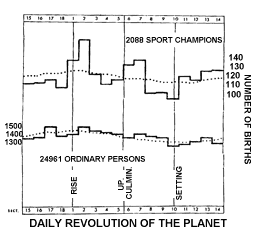 |
Science Frontiers ONLINE No. 61: Jan-Feb 1989 |
|
|
Celestial Influences
The "Mars Effect" refers to the "significant tendency for champion athletes to have been born at the time of either the rise or the upper culmination of the planet Mars." What has the position of Mars in the earth's sky to do with an athlete's prowess? No one knows! And certainly no scientist who wants to remain employed will try to find out.
 Distribution in 18 Mars sectors for sports champions (top) and ordinary people (below). Solid lines are observed numbers; dotted lines, expected numbers. The two peaks in the graph occur at the rise and upper culmination of Mars. |
We have M. Gauquelin to thank for discovering the Mars Effect. Gauquelin began his research with checking out the claims of conventional astrology. He "found no truth whatever behind certain major tenets of the horoscope, including the alleged influence of the signs of the zodiac, the reality of the astrological 'aspects,' the reported role of the 'houses,' or the prediction of future events." That's the good news, now here's the bad. During his work, he recorded the birth dates of thousands of French men and women who were especially successful in various endeavors, especially sports. These data, easily veri-fied, do seem to demonstrate that the Mars effect truly exists!
G. Abell, who was a reknowned astronomer, did not categorically reject Gauquelin's claims. But he was not happy with them:
"To be honest, I am highly skeptical of Gauquelin's findings and his hypothesis. The main reason is that I cannot imagine a mechanism whereby the effect can be produced. However, I do not know that the effect is not there; my skepticism cannot be considered closed-mindedness, any more than a gullible acceptance of astrology should be regarded as openmindedness. If the planetary effects suggested by Gauquelin are real, then his discovery is of profound importance. Consequently, I think the Gauquelin evidence, based on a great mass of data collected over many years, deserves to be checked out."
While Gauquelin has concentrated on sports champions, he has found similar effects for other vocations. Musicians, for example, have a negative Mars Effect. (Obviously, violinists should not compete in the broad jump!) Scientists are positive with Saturn; actors are positive with Jupiter. And so on.
(Gauquelin, Michel; "Is There a Mars Effect?" Journal of Scientific Exploration, 2:29, 1988.)
Comment. In the indented quotation above, Abell could not imagine a "mechanism" for the Mars Effect. Yet, Mars and the other planets are drawn to the sun by gravitation, which is just as "mechanismless" as are the other actionat-a-distance forces. We can write an equation for gravitational force, and perhaps because of this and long familiarity, we feel comfortable with gravitation. But is it any less spooky than the Mars Effect?
Reference. The "Mars Effect" and related phenomena are covered in BHB27-BHB30 in our catalog: Biological Anomalies: Humans I. Details about this book may be found at: here.